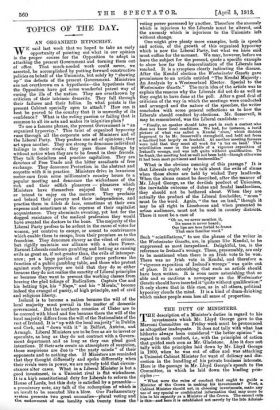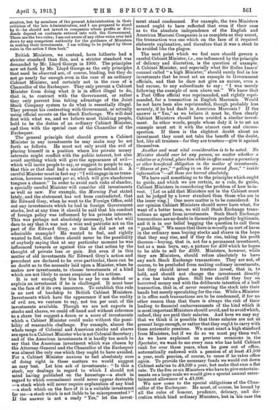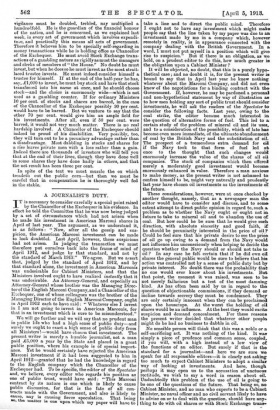THE DUTY OF MINISTERS.
ITHE description of a Minister's duties in regard to his investments which Mr. Lloyd George gave to the Marconi Committee on Friday week must be pronounced as altogether inadequate. It does not tally with what has hitherto always been considered "the better opinion" in regard to such conduct, i.e., with the principles of action that guided such men as Mr. Gladstone. Also it does not tally with the principles laid down by Mr. Lloyd George in 1900, when he was out of office and was attacking a Unionist Cabinet Minister for want of delicacy and dis- cretion in the handling of his private business interests. Here is the passage in Mr. Lloyd George's speech to the Committee, in which he laid down the binding prin- ciples :— " What were the rules of conduct that ought to guide a. Minister of the Crown in making his investments ? First, a. Cabinet Minister should not, in choosing investments, make any use of any special or confidential information that may come to him in his capacity as a Minister of the Crown. The second rule is this—and here it is established not merely by the late Admini-% titration, but by members of the present Administration in their criticism of the late Administration, and I am prepared to stand by it—be should not invest in companies whose profits or divi- dends depend on contracts entered into with the Government. These are the two rules; lam not aware of any other rules over laid down by any competent authority for the guidance of Ministers in making their investments. I am willing to be judged by these rules in the action I then took."
British Ministers, we contend, have hitherto had a stricter standard than this, and a stricter standard was demanded by Mr. Lloyd George in 1900. The principles now set forth by Mr. Lloyd George as the only principles that need be observed are, of course, binding, but they do not go nearly far enough even in the case of an ordinary Cabinet Minister, and certainly not in the case of a Chancellor of the Exchequer. They only prevent a Cabinet Minister from doing what it is in effect illegal to do, that is, to contract with the Government, or rather they only prevent him taking advantage of the Joint Stock Company system to do what is essentially illegal. They prevent his contracting with Government, or actually using official secrets on the Stock Exchange. We will deal first with what we, and we believe most thinking people, hold to be the duties of an ordinary Cabinet Minister, and then with the special case of the Chancellor of the Exchequer. The general principle that should govern a Cabinet Minister in any investments he may make may be set forth as follows. He must not only avoid the evil of placing himself in a position where his private money interests might conflict with the public interest, but also avoid anything which will give the appearance of evil— which will incite people to say, or suggest to people to say, that this or that deal had a sinister motive behind it. A careful Minister must in fact say : "I will engage in no trans- action, however innocent per se, which will give slanderous tongues a chance." In order to avoid such risks of slander, a specially careful Minister will consider old investments as well as new. For example, the Morning Post stated lately, and the statement has not been contradicted, that Sir Edward Grey, when he went to the Foreign Office, sold out any investments which be had in foreign Government stocks, lest at any time it should be said that his conduct of foreign policy was influenced by his private interests. This was perhaps not absolutely necessary, but who will dare to say that it was not a wise and patriotic act on the part of Sir Edward Grey, or that be did not set an admirable example? He wanted to feel, and rightly wanted to feel, that there should never be the possibility of anybody saying that at any particular moment he was influenced towards or against this or that action by the thought of private loss or gain. But even if in this matter of old investments Sir Edward Grey's action and precedent are declared to be over-particular, there can be no doubt as to the necessity laid upon a Minister, when he makes new investments, to choose investments of a kind which are not likely to cause suspicion of his actions.
It is not enough for him to say he can defend or explain an investment if he is challenged. It must bear on the face of it its own innocence. To establish this rule is no sort of hardship to British Cabinet Ministers. Investments which have the appearance if not the reality of evil are, we venture to say, not ten per cent. of the investments available. Though we are not experts in stocks and shares, we could off-hand and without reference to a share list suggest a dozen or a score of investments which a Cabinet Minister could make without the possi- bility of reasonable challenge. For example, almost the whole range of Colonial and American stocks and shares are open to a Cabinet Minister who is not Colonial Secretary; and of the American investments it is hardly too much to say that the American investment which was chosen by the Attorney-General and the Chancellor of the Exchequer was almost the only one which they ought to have avoided. For a Cabinet Minister anxious to feel absolutely sure of doing right in these matters we would suggest an easy test. Let him ask of investments : "Is this a stock, my dealings in regard to which I should not mind having published on the housetops—a stock in regard to which concealment could never appear desirable —a stock which will never require explanation of any kind —a stock which on the face of it is a suitable investment for me—a stock which is not liable to be misrepresented ? " If the answer is not a ready "Yes," let the invest- ment stand condemned. For example, the two Ministers named ought to have reflected that even if their case as to the absolute independence of the English and American Marconi Companies is as complete as they assert, the transaction was one which on the face of it required elaborate explanation, and therefore that it was a stock to be avoided like the plague.
The next point which we feel sure should govern a careful Cabinet Minister, i.e., one influenced by the principle of delicacy and discretion, is the question of example. A. Cabinet Minister, and especially what Sir Rufus Isaacs' counsel called "a high Minister," should surely feel in his investments that he must set an example to Government officials, and that he dare not give an excuse, even a bad excuse, to any subordinate to say : "I was merely following the example of men above me." We know that a Post Office official was reprimanded, and rightly repri- manded, for a transaction in English Marconis. Would he not have been also reprimanded, though probably less severely, if he had dealt in American Marconis ? If the answer is "Yes," as we believe it must be, then clearly Cabinet Ministers should have avoided a similar invest- ment. In other words, people whose duty it is to set an example must set it with the utmost care and circum- spection. If there is the slightest doubt about an investment they must not take the benefit of the doubt, but, like all trustees--for they are trustees—give it against themselves.
Another and most vital consideration is to be noted. No Minister should ever let any person, no matter whether a relative or a friend, place him while in office under a pecuniary or other beneficial obligation in the matter of investments. "Shares at par," "getting in on. the ground floor," "inside information "—all these are barred absolutely.
We have said something as to the principles which ought to guide, and which we are certain, as a rule, do guide, Cabinet Ministers in considering the problem of how to in- vest. [Let us add that Ministers not in the Cabinet must not be judged by a lower standard than those who are in the inner ring.] One more matter is to be considered. In our opinion Cabinet Ministers should never have what, for want of a better term, we will call Stock Exchange trans- actions as apart from investments. Such Stock Exchange transactions are no doubt in themselves perfectly legitimate, and it is in our belief begging the question to call them "gambling." We mean that there is morally no sort of harm in the ordinary man buying stocks and shares in the hope that they may rise, and if they do rise, taking his profit thereon—buying, that is, not for a permanent investment, but as a man buys, say, a picture for £50 which he hopes to be able to sell for £500. Ministers, however, while they are Ministers, should refuse absolutely to have any such Stock Exchange transactions. They are not, of course, to be precluded from making ordinary investments, but they should invest as trustees invest, that is, to hold, and should not change the investment directly a rise has taken place. Still less should they buy on borrowed money and with the deliberate intention of a bull transaction, that is, of never receiving the stock into their hands but merely speculating for the rise. While a, Minister is in office such transactions are to be condemned, if for no other reason than that there is always the risk of their leading to financial embarrassments of the kind which it is most important Ministers should avoid, and to avoid which, indeed, they are paid their salaries. And here we may say that we think it is possible that these salaries are not at present large enough, or rather that they ought to carry with them automatic pensions. We must exact a high standard from Ministers, but if we do so we must pay them well. As we have explained on previous occasions in the Spectator, we want to see every man who has held Cabinet rank for over three years, when he goes out of office, automatically endowed with a pension of at least £1,500 a year, such pension, of course, to cease if he takes office again. To provide the necessary funds we would cut down Cabinet salaries to £4,500 a year, but make that sum a flat rate. To the five or six Ministers who have to give entertain- ments on a large scale we would give a special annual enter- tainment allowance of a £1,000.
We now come to the special obligations of the Chan- cellor of the Exchequer. He must, of course, be bound by all the rules of honour, prudence, delicacy, and dis- cretion which bind ordinary Ministers, but in his case the vigilance must be doubled, trebled, nay multiplied a hundredfold. Fie is the guardian of the financial honour of the nation, and he is concerned, as we explained last week, in every act of government which involves expendi- tu..-e, and practically this means all acts of government. Therefore it behoves him to be specially self-regarding in money transactions while he is holding office as Chancellor of the Exchequer. He must avoid Stock Exchange trans- actions of a gambling nature as rigidly as must the managers and clerks of members of " the House." No doubt he must invest,but when he does so he must invest as the most strait- laced trustee invests. He must indeed consider himself a trustee for himself. If at the end of the half-year he has, say, ,X1,000 to invest, he must buy stock and have that stock transferred into his name at once, and he should choose stock—and the choice is enormously wide—which is not used as a gambling counter. If for ordinary Ministers 10 per cent. of stocks and shares are barred, in the case of the Chancellor of the Exchequer possibly 30 per cent. would have to be barred. But we venture to say that the other 70 ner cent. would give him an ample field for his investments. After all, even if 50 per cent, were barred, it would not very much matter. There is no real hardship involved. A Chancellor of the Exchequer should indeed be proud of his disabilities. Very possibly, too, they will turn out to be a pecuniary advantage rather than a disadvantage. Most dabbling in stocks and shares for a rise leaves private men with a loss rather than a gain. Indeed there are thousands of investors who will tell you that at the end of their lives, though they have done well in some shares they have done badly in others, and that the net result has been three per cent.
In spite of the text we must muzzle the ox which treadeth out the public corn—but then we must be careful that in compensation he is thoroughly well fed in the stable.
















































 Previous page
Previous page